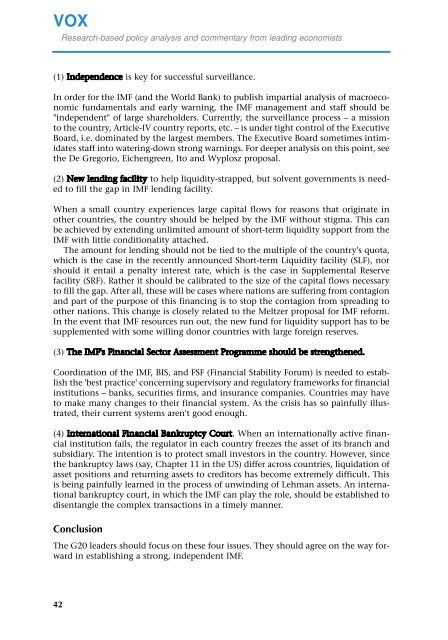What G20 Leaders Must Do To Stabilise our Economy and Fix ... - Vox
What G20 Leaders Must Do To Stabilise our Economy and Fix ... - Vox
What G20 Leaders Must Do To Stabilise our Economy and Fix ... - Vox
Create successful ePaper yourself
Turn your PDF publications into a flip-book with our unique Google optimized e-Paper software.
VOXResearch-based policy analysis <strong>and</strong> commentary from leading economists(1) Independence is key for successful surveillance.In order for the IMF (<strong>and</strong> the World Bank) to publish impartial analysis of macroeconomicfundamentals <strong>and</strong> early warning, the IMF management <strong>and</strong> staff should be"independent" of large shareholders. Currently, the surveillance process – a missionto the country, Article-IV country reports, etc. – is under tight control of the ExecutiveBoard, i.e. dominated by the largest members. The Executive Board sometimes intimidatesstaff into watering-down strong warnings. For deeper analysis on this point, seethe De Gregorio, Eichengreen, Ito <strong>and</strong> Wyplosz proposal.(2) New lending facility to help liquidity-strapped, but solvent governments is neededto fill the gap in IMF lending facility.When a small country experiences large capital flows for reasons that originate inother countries, the country should be helped by the IMF without stigma. This canbe achieved by extending unlimited amount of short-term liquidity support from theIMF with little conditionality attached.The amount for lending should not be tied to the multiple of the country's quota,which is the case in the recently announced Short-term Liquidity facility (SLF), norshould it entail a penalty interest rate, which is the case in Supplemental Reservefacility (SRF). Rather it should be calibrated to the size of the capital flows necessaryto fill the gap. After all, these will be cases where nations are suffering from contagion<strong>and</strong> part of the purpose of this financing is to stop the contagion from spreading toother nations. This change is closely related to the Meltzer proposal for IMF reform.In the event that IMF res<strong>our</strong>ces run out, the new fund for liquidity support has to besupplemented with some willing donor countries with large foreign reserves.(3) The IMF's Financial Sector Assessment Programme should be strengthened.Coordination of the IMF, BIS, <strong>and</strong> FSF (Financial Stability Forum) is needed to establishthe 'best practice' concerning supervisory <strong>and</strong> regulatory frameworks for financialinstitutions – banks, securities firms, <strong>and</strong> insurance companies. Countries may haveto make many changes to their financial system. As the crisis has so painfully illustrated,their current systems aren't good enough.(4) International Financial Bankruptcy C<strong>our</strong>t. When an internationally active financialinstitution fails, the regulator in each country freezes the asset of its branch <strong>and</strong>subsidiary. The intention is to protect small investors in the country. However, sincethe bankruptcy laws (say, Chapter 11 in the US) differ across countries, liquidation ofasset positions <strong>and</strong> returning assets to creditors has become extremely difficult. Thisis being painfully learned in the process of unwinding of Lehman assets. An internationalbankruptcy c<strong>our</strong>t, in which the IMF can play the role, should be established todisentangle the complex transactions in a timely manner.ConclusionThe <strong>G20</strong> leaders should focus on these f<strong>our</strong> issues. They should agree on the way forwardin establishing a strong, independent IMF.42














